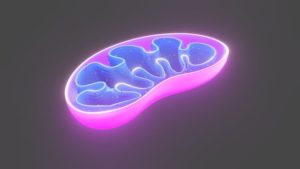In the new peer-reviewed study “Childhood adverse life events and skeletal muscle mitochondrial function” [1] the researchers could show how adverse childhood events can impair muscle function in later age.
 Using data from the Study of Muscle, Mobility, and Aging, 879 persons over the age of 70 were tested for ATP production in their muscle cells. ATP is the energy with which muscles work, it is produced by the mitochondria in each cell. Mitochondria can sense social stress and react on a cellular level: they are known to change their function and form when cells are being threatened by physical or social attacks, leading to extracellular ATP and Reactive Oxygen Species – so-called Free Radicals. This decreases the cells’ working energy and promotes inflammation and aging. [2] [3]
Using data from the Study of Muscle, Mobility, and Aging, 879 persons over the age of 70 were tested for ATP production in their muscle cells. ATP is the energy with which muscles work, it is produced by the mitochondria in each cell. Mitochondria can sense social stress and react on a cellular level: they are known to change their function and form when cells are being threatened by physical or social attacks, leading to extracellular ATP and Reactive Oxygen Species – so-called Free Radicals. This decreases the cells’ working energy and promotes inflammation and aging. [2] [3]
Obviously, muscle cells and their mitochondria can be primed for such reactions even later in life by trauma in childhood: the more adverse childhood events were reported by the study participants, the more pronounced was the decrease in cellular ATP. Other possible influencing factors such as age, gender, education, body mass index, depressive symptoms, smoking or physical activity were controlled for and didn’t change these results. In previous studies, similar coincidences have been found for blood cells. [4] [5] [6]
These findings shed a light on the mechanisms of biological reactions and imprinting after socio-psychological trauma that we recognize in META-Health. Adverse childhood events for many persons translate into feelings of unsafety and helplessness that tend to trigger an inhibitory response in their autonomic nerves – a freeze or collapse reaction of energylessness. [7] [8] This unconscious survival strategy and the cues that trigger it becomes a default that impacts all levels of biological functioning and health.
 Further implications of this unconscious biology are cognitive: our experiences shape our beliefs and expectations, our self-image and our values. Our psychological profile thus becomes a predictor for health challenges in the present and future.
Further implications of this unconscious biology are cognitive: our experiences shape our beliefs and expectations, our self-image and our values. Our psychological profile thus becomes a predictor for health challenges in the present and future.
Usually, the work of META-Health practitioners consists mainly of modulating the cognitive and emotional aspects of health, healing and dis-ease prevention. Processing, re-negotiating and transforming trauma and our patterns of responses seems to be a prerequisite for optimizing the strength, mobility and resilience we want to keep when getting older!
References:
[1] https://www.science.org/doi/full/10.1126/sciadv.adj6411
[2] https://www.sciencedirect.com/science/article/pii/S0028390822003926
[3] http://naviauxlab.ucsd.edu/wp-content/uploads/2018/10/NaviauxHealingCycle_2018_v2.pdf
[4] https://pubmed.ncbi.nlm.nih.gov/29525040/
[5] https://pubmed.ncbi.nlm.nih.gov/27530300/
[6] https://pubmed.ncbi.nlm.nih.gov/33004627/
[7] https://www.ncbi.nlm.nih.gov/pmc/articles/PMC3108032
[8] http://naviauxlab.ucsd.edu/wp-content/uploads/2018/10/NaviauxHealingCycle_2018_v2.pdf
pictures: Pixabay users Gerd Altmann, SkieTheAce

